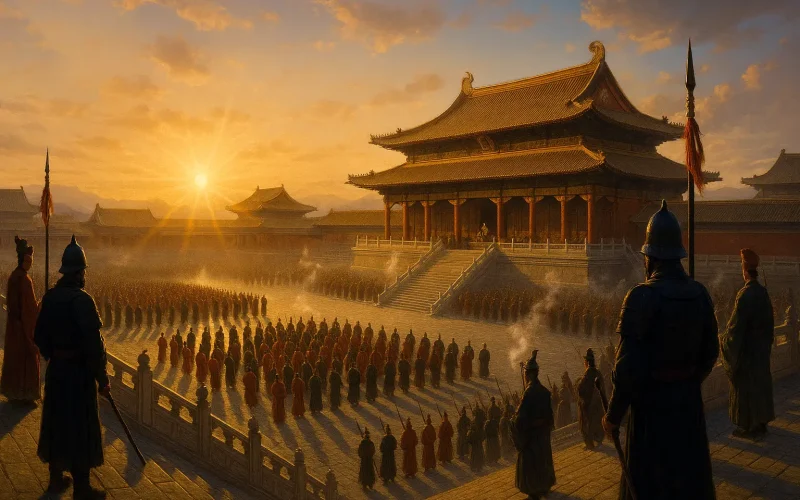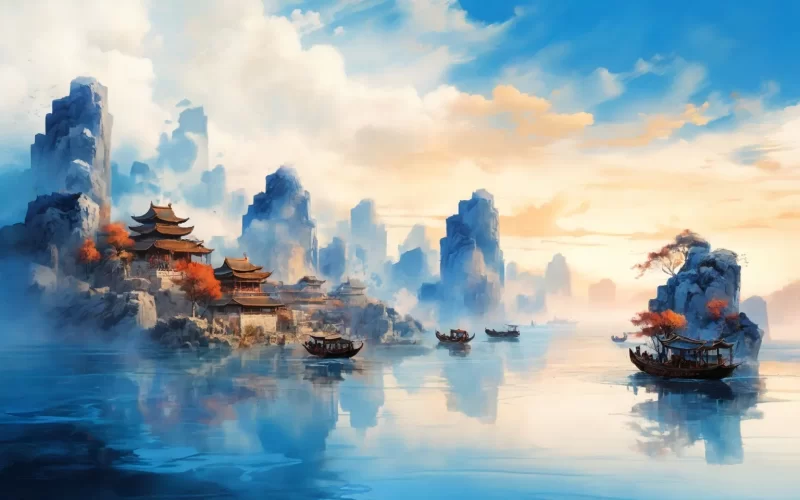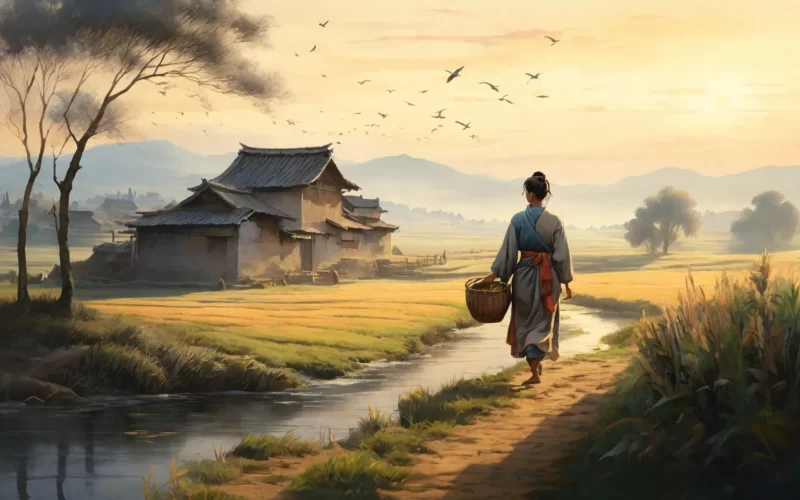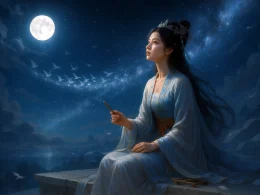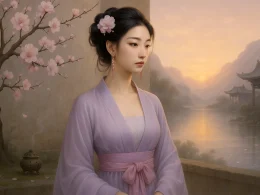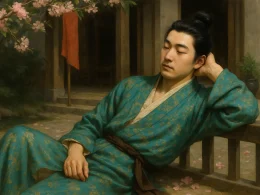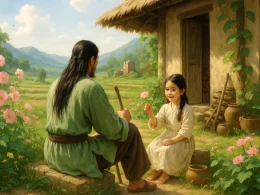The crimson-capped herald has just announced the dawn;
The Keeper of the Robes presents the jade-embroidered gown.
The Ninefold Gates swing wide, revealing courts and halls;
Envoys from myriad lands bow to the Pearl-Stringed Crown.
Sunlight now steeps the giant, stone-carved guardian palms;
Incense smoke coils and clings to the Dragon-Embroidered Robe.
The levee ends — and soon the five-colored edicts draft,
With girdle-gems a-jingle, toward the Phoenix Lake they go.
Original Poem
「和贾至舍人早朝大明宫之作」
王维
绛帻鸡人送晓筹,尚衣方进翠云裘。
九天阊阖开宫殿,万国衣冠拜冕旒。
日色才临仙掌动,香烟欲傍衮龙浮。
朝罢须裁五色诏,佩声归向凤池头。
Interpretation
This poem stands as the crowning achievement among Wang Wei’s poetic responses to imperial compositions, and a pinnacle exemplar of High Tang court poetry that masterfully combines majestic atmosphere, ornate beauty, and refined artistry. Composed in the spring of the first year of the Qianyuan era (758 AD), a time when the An Lushan Rebellion had just been quelled and the Tang dynasty sought to reaffirm its order, Wang Wei, serving as a Zhongshu Sheren (Secretarial Court Gentleman), personally witnessed the morning audience ritual. Yet, with a visionary breadth and poetic sensibility transcending his official role, he forged a political ceremony into a grand symbol that crystallized the ideals of the High Tang, displayed imperial dignity, and gave voice to literati ambition. The eight lines of the poem unfold like a slowly unfurling, gold-and-jade landscape handscroll, constructing within the flow of time and expanse of space a sacred, ordered, splendid, and dynamically vibrant poetic empire.
First Couplet: 绛帻鸡人送晓筹,尚衣方进翠云裘。
Jiàng zé jī rén sòng xiǎo chóu, shàng yī fāng jìn cuì yún qiú.
The red-turbaned Cockman delivers dawn’s tally sticks;
The Keeper of the Wardrobe presents the kingfisher-feather coat.
The opening focuses with great artistry on the most minute preparatory rituals before dawn. "Red turban" and "kingfisher-feather" form a vivid and solemn chromatic counterpoint—one the identifying color of the attendant (red), the other the exclusive hue of the emperor (kingfisher-blue)—instantly establishing the strict hierarchical order and visual spectrum of the court. "Delivers dawn’s tally sticks" is a temporal ritual; "presents the kingfisher-feather coat" is a spatial one. Their synchronous performance implies the entire imperial apparatus is being activated with precision as dawn arrives. The word "just" is especially fine, indicating the timeliness and inevitability of the action, presenting a flawless, seemingly divinely ordained courtly rhythm.
Second Couplet: 九天阊阖开宫殿,万国衣冠拜冕旒。
Jiǔ tiān chāng hé kāi gōng diàn, wàn guó yī guān bài miǎn liú.
The nine-tiered heaven’s portals let the palace be seen;
From ten thousand states, hats and robes pay homage to crowned heads.
This couplet, like the climax of a symphony, presents the core scene of the morning audience head-on, with majestic vigor and transcendent imagination. "The nine-tiered heaven’s portals" sanctifies the Daming Palace with mythological imagery, endowing it with the symbolic meaning of connecting to the heavens; the word "let… be seen" or "open" carries immense ceremonial weight and a sense of power, as if the gates of the cosmos are swinging wide. "From ten thousand states, hats and robes" is classic High Tang rhetoric, being both realistic (referring to officials and envoys of various peoples) and idealistic (symbolizing the political ideal of "all under heaven as one family"); "pay homage to crowned heads" focuses the vision on the symbol of imperial authority (the emperor’s crown with its jade pendants), completing the visual focus from space (the palace) to the seat of power (the emperor). With its perfectly balanced parallelism and vast imagery, this couplet establishes the poem’s solemn, lofty, all-encompassing imperial aesthetic tone.
Third Couplet: 日色才临仙掌动,香烟欲傍衮龙浮。
Rì sè cái lín xiān zhǎng dòng, xiāng yān yù bàng gǔn lóng fú.
Sunlight, arriving, sets the immortal’s palm in motion;
Incense smoke intends to cling to the dragon-robe, to float.
The brushstrokes shift from grand narrative to exquisite close-up, capturing the most poetic moments of light, shadow, and scent during the audience. "Sunlight, arriving" and "sets… in motion" form a causal relationship; light becomes the ultimate command initiating the ritual, imbuing the scene with a mystical color of interaction between celestial phenomena and human affairs. "Incense smoke intends to cling to the dragon-robe, to float" is a stroke of genius. The smoke, inherently mindless, is personified by the words "intends to cling", as if even the smoke recognizes imperial majesty and actively seeks to attend it. The word "float" describes both the ethereal state of the smoke and subtly suggests the vividness of the embroidered dragons and the ascending quality of power. Using the flow of light and smoke, this couplet animates the static regalia and robes, infusing solemnity with a lively vitality and a sense of elusive divinity.
Fourth Couplet: 朝罢须裁五色诏,佩声归向凤池头。
Cháo bà xū cái wǔ sè zhào, pèi shēng guī xiàng fèng chí tóu.
The audience ended, we must cut five-hued decree paper;
With a tinkle of girdle-gems, I go back to Phoenix Pool.
The conclusion returns to the poet’s (and Jia Zhi’s) own duty and destination, shifting from the sacred audience hall back to the prestigious government office, completing the ceremonial cycle. The words "The audience ended" provide continuity, marking a shift in time and scene. "Must cut five-hued decree paper" highlights the core function of the Zhongshu Sheren: to "speak for the king." The "five hues" correspond to the Five Elements, symbolizing the decree’s authority and all-encompassing political efficacy. "With a tinkle of girdle-gems, I go back to Phoenix Pool" uses sound to depict people, motion to imply composure: the clear chime of jade pendants is an auditory portrait of the official’s measured, graceful stride; "go back to Phoenix Pool" (the Secretariat) implies that the final purpose of this grand ritual is to translate these sacred moments into concrete instruments of governance. This final couplet embeds the individual (the literatus and close minister) into the imperial narrative, highlighting the unique position and sense of pride of high-ranking Tang literati-officials at the heart of power, who both participated in the rituals and shouldered practical responsibilities.
Holistic Appreciation
This is a model work whose structure resembles an exquisite palace architecture and whose meaning resonates like an imperial spiritual totem. The poem strictly follows the natural progression of time and space: the first couplet describes "before the audience" (preparation), the second "during the audience" (climax), the third "during the audience" (details), and the fourth "after the audience" (implementation). The four couplets correspond respectively to a shift in focus from "people (attendants) — heaven (emperor) — light (celestial sign) — minister (literatus-official)", together constructing a complete, harmonious, and dynamically vibrant universe of power and ritual.
In this poem, Wang Wei successfully elevated the often-formulaic genre of poetic responses to imperial compositions to unprecedented artistic and intellectual heights. Not content with generic praise of the spectacle, he used the keen eye of a poet-painter to delve into the ritual’s fabric, capturing those most symbolic colors, sounds, lights, shadows, and movements, and imbuing them with profound cultural and political significance. The poem contains both the grand narrative of "From ten thousand states, hats and robes pay homage", displaying the High Tang’s breadth and confidence, and the subtle perception of "Incense smoke intends to cling to the dragon-robe, to float", reflecting the literatus’s near-spiritual aesthetic intuition. More importantly, in the final couplet he masterfully achieved a unity of "praising the sovereign" and "self-portrayal"—while glorifying imperial majesty, he also highlighted the crucial role of himself (and Jia Zhi) as transmitters of culture and executors of policy. This makes the poem both an imperial ode and a literatus’s self-portrait.
Artistic Merits
- Meticulous Construction of an Imagery System: The poem establishes a complete system of court imagery: temporal images (dawn tally sticks, sunlight), spatial images (nine-tiered heaven’s portals, palace, Phoenix Pool), human images (Cockman, Keeper of the Wardrobe, myriad officials, immortal’s palm/emperor), and object images (kingfisher-feather coat, crown pendants, dragon robe, five-hued decree paper, girdle-gems). These images are hierarchically clear and interconnected, jointly supporting the poem’s grand structure.
- Precision of Verbs and Bestowal of Meaning: "Delivers," "presents," "let be seen/open," "pay homage," "arriving," "sets in motion," "intends to cling," "float," "cut," "go back." These verbs accurately depict action and, moreover, imply power relations, ritual order, and poetic imagination. For example, the solemnity of "open," the order of "pay homage," the liveliness of "float," the composure of "go back."
- Courtly Symphony of Color and Sound: "Red," "kingfisher-feather," "five-hued" constitute a resplendent visual spectrum; "tinkle of girdle-gems" is a clear, high-pitched auditory detail. Words like "nine-tiered heaven," "immortal’s palm," "incense smoke," "dragon-robe" collectively construct a transcendent, slightly Daoist-tinged sacred atmosphere, fitting the characteristic Tang court culture blending Confucianism and Daoism.
- Extreme Parallel Precision and Flowing Vitality: The parallelism of the middle two couplets is exemplary, flawless in formal balance yet not a word feels stiff. "Nine-tiered heaven" parallels "ten thousand states" (space vs. space), "portals" parallels "hats and robes" (architecture vs. people), "let be seen/open" parallels "pay homage" (action vs. action); "sunlight" parallels "incense smoke" (natural vs. man-made), "arriving" parallels "intends to cling" (temporal vs. intentional), "sets the immortal’s palm in motion" parallels "cling to the dragon-robe, to float" (regalia vs. apparel). Perfectly balanced to this degree, yet the poetic meaning flows and the vital energy connects, demonstrating Wang Wei’s consummate mastery of language.
Insights
This is not merely a poem, but a glorious window into the state aesthetics and literati spiritual world of the High Tang. It reveals that great art can be born from the most solemn rituals and most institutionalized settings, the key being whether the creator possesses the mental power to transform them into eternal symbols and aesthetic forms. That Wang Wei distilled a daily political ceremony into timeless imagery concerning order, authority, civilization, and the responsibility of the literati is itself an extraordinary cultural creation.
In contemporary society, a sense of ritual, order, and grand narrative often face deconstruction. This poem reminds us that humanity’s pursuit of solemnity, harmony, and transcendent meaning possesses eternal value. It prompts us to consider: in our pluralistic, fragmented age, can we, and how can we, reconstruct in public life certain "rituals" possessing aesthetic height and spiritual inspiration? And how can individuals, especially intellectuals and professionals, find their own creative place within vast systems and processes, like the Zhongshu Sheren in Wang Wei’s poem, and leave behind a meaningful, aesthetically resonant "tinkle of girdle-gems"?
This poem is Wang Wei’s ode to the High Tang, and also a noble, tender invitation issued across a millennium to all souls who find themselves within systems, yet yearn to contribute to the world with beauty and wisdom.
Poem translator
Kiang Kanghu
About the poet

Wang Wei (王维), 701 - 761 A.D., was a native of Yuncheng, Shanxi Province. Wang Wei was a poet of landscape and idylls. His poems of landscape and idylls, with far-reaching images and mysterious meanings, were widely loved by readers in later generations, but Wang Wei never really became a man of landscape and idylls.






